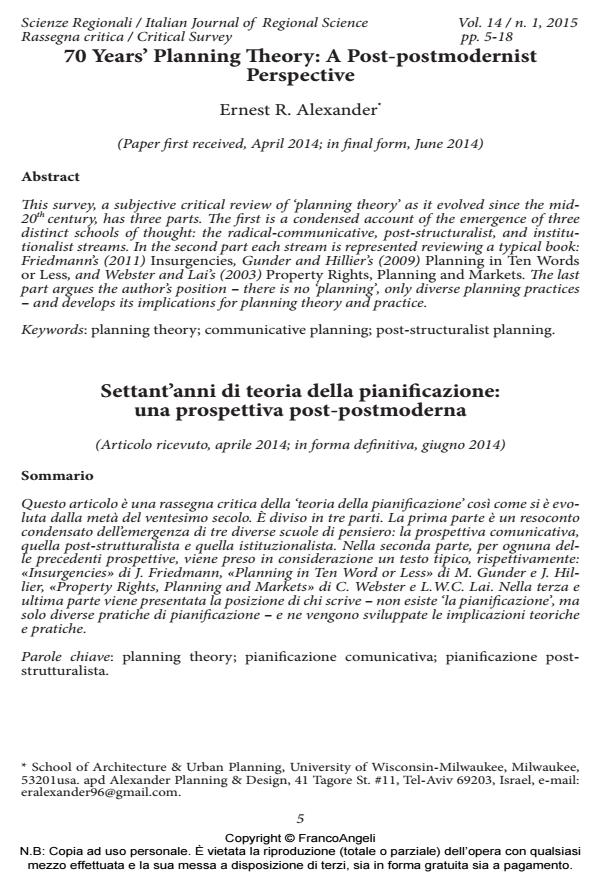70 Years’ Planning Theory: A Post-postmodernist Perspective
Titolo Rivista SCIENZE REGIONALI
Autori/Curatori Ernest R. Alexander
Anno di pubblicazione 2015 Fascicolo 2015/1
Lingua Inglese Numero pagine 14 P. 5-18 Dimensione file 125 KB
DOI 10.3280/SCRE2015-001001
Il DOI è il codice a barre della proprietà intellettuale: per saperne di più
clicca qui
Qui sotto puoi vedere in anteprima la prima pagina di questo articolo.
Se questo articolo ti interessa, lo puoi acquistare (e scaricare in formato pdf) seguendo le facili indicazioni per acquistare il download credit. Acquista Download Credits per scaricare questo Articolo in formato PDF

FrancoAngeli è membro della Publishers International Linking Association, Inc (PILA)associazione indipendente e non profit per facilitare (attraverso i servizi tecnologici implementati da CrossRef.org) l’accesso degli studiosi ai contenuti digitali nelle pubblicazioni professionali e scientifiche
This survey, a subjective critical review of ‘planning theory’ as it evolved since the mid- 20th century, has three parts. The first is a condensed account of the emergence of three distinct schools of thought: the radical-communicative, post-structuralist, and institutionalist streams. In the second part each stream is represented reviewing a typical book: Friedmann’s (2011) Insurgencies, Gunder and Hillier’s (2009) Planning in Ten Words or Less, and Webster and Lai’s (2003) Property Rights, Planning and Markets. The last part argues the author’s position - there is no ‘planning’, only diverse planning practices - and develops its implications for planning theory and practice.
Questo articolo è una rassegna critica della ‘teoria della pianificazione’ così come si è evoluta dalla metà del ventesimo secolo. È diviso in tre parti. La prima parte è un resoconto condensato dell’emergenza di tre diverse scuole di pensiero: la prospettiva comunicativa, quella post-strutturalista e quella istituzionalista. Nella seconda parte, per ognuna delle precedenti prospettive, viene preso in considerazione un testo tipico, rispettivamente: «Insurgencies» di J. Friedmann, «Planning in Ten Word or Less» di M. Gunder e J. Hillier, «Property Rights, Planning and Markets» di C. Webster e L.W.C. Lai. Nella terza e ultima parte viene presentata la posizione di chi scrive - non esiste ‘la pianificazione’, ma solo diverse pratiche di pianificazione - e ne vengono sviluppate le implicazioni teoriche e pratiche.
Parole chiave:Planning theory; pianificazione comunicativa; pianificazione poststrutturalista.
- Modernist magic: Not guilty; post-postmodernist—Yes Ernest R Alexander, in Planning Theory /2017 pp.227
DOI: 10.1177/1473095216676769
Ernest R. Alexander, 70 Years’ Planning Theory: A Post-postmodernist Perspective in "SCIENZE REGIONALI " 1/2015, pp 5-18, DOI: 10.3280/SCRE2015-001001